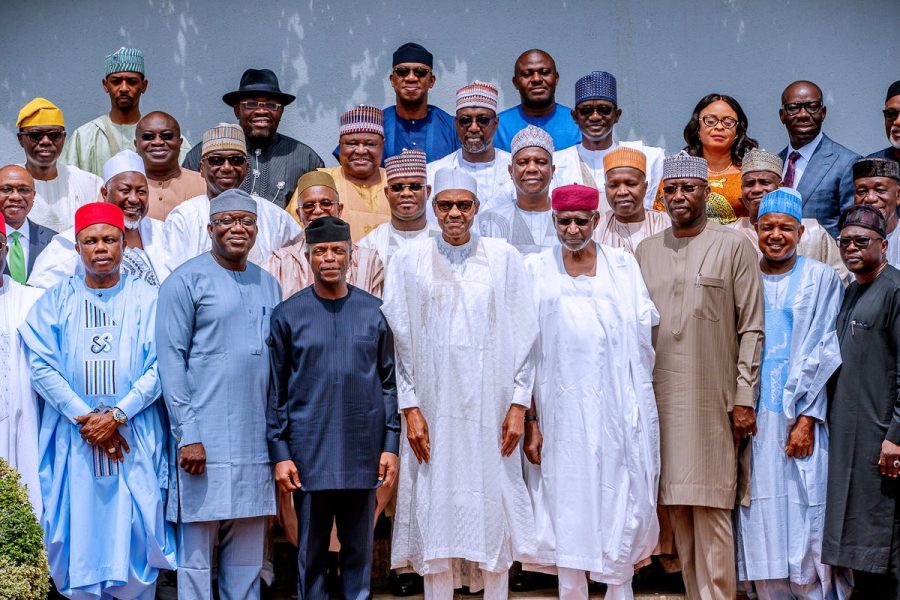The Federation Account Allocation Committee (FAAC), disbursed the sum of N696.18 billion to the Federal, State, and Local governments in July 2020, from the revenue generated in the month of June 2020. This was stated in the latest FAAC report, released by the National Bureau of Statistics (NBS).
According to the report, the monthly disbursement increased by 27.2% compared to N547.3 billion shared in June, and 14.8% increase compared to N606.2 billion disbursed in May 2020.
READ: Nigeria total public debt hits N31 trillion as debt service gulp over N1.2 trillion in H1 2020
Checks by Nairametrics research, shows that a total of N4.58 trillion has been shared to the three tiers of government, between January and July 2020. Highest disbursement was recorded in April (N780.9 billion), followed by N716.3 billion in January 2020.
Meanwhile, Lagos State – the economic hub of Nigeria, parted with N1.46 billion as external debt deductions in the month, indicating a total of N9.74 billion deductions between January and July 2020.
Explore the Nairametrics Research Website for Economic and Financial Data
Breakdown
- The amount disbursed in July comprised of N474.53 billion from the Statutory Account, N128.83 billion from Valued Added Tax (VAT), N42.83 billion from Exchange Gain Differences, and Distribution of N50 billion from Non-Oil Revenue for the Month.
- Federal Government received a total of N266.13 billion from the total disbursement. States received a total of N185.77 billion, and Local Governments received N138.97 billion.
- The sum of N28.50 billion was shared among the oil producing states as 13% derivation fund.
- Revenue generating agencies such as Nigeria Customs Service (NCS), Federal Inland Revenue Service (FIRS), and Department of Petroleum Resources (DPR) received N6.32 billion, N15.05 billion, and N2.68 billion respectively as cost of revenue collections.
READ: Nigeria considers request for debt relief as debt stock climbs

South-South scoops highest share
The South-South region, also known as the Niger Delta region, received the highest share of the disbursement in the month of July. The region received a sum of N49.44 billion, representing 25.4% of the total net allocation for states.
This is largely because the region contributes mostly to crude oil production in Nigeria, which is a significant source of revenue for the federation. Out of the six states in the region, only Cross River State is not an oil producing state. Hence, Rivers, Edo, Akwa Ibom, Bayelsa, and Delta States received a total of N24.28 billion as part of 13% oil derivation fund.
North-West region received N36.83 billion (18.9%); followed by North-Central region, which received a net total of N30.69 billion (15.8%). Others include South-West (N29.55 billion), North-East (N26.32 billion), and South-East (N21.97 billion).
READ: Fidelity Bank to raise N50 billion in bonds in Q4 to refinance existing debts

External debt deductions
A total of N4.47 billion was deducted from the state’s allocation, as external debt deductions for the month of July. Lagos State parted with the highest amount of N1.46 billion, representing 32.6% of the total debt deductions in the month. A sum of N9.74 billion has been deducted as a result of external debt obligations between January and July 2020.
READ: Investors flee Nigerian Stocks as FDI and FPI dips
It is worth noting that, the State’s external debt has declined by 9.67%, from $1.39 billion recorded as at the end of December 2019 to $1.26 billion in June 2020.
Others on the list of top 5 deductions are, Kaduna (N414.6 million), Oyo (N305.4 million), Rivers (N280.3 million), and Cross River (N222 million). On the flip side, Ogun State parted with the lowest, as N9.1 million was deducted, followed by Borno (N21.6 million), and Taraba (N24.5 million).
READ: Nigeria’s manufacturing sector contracts for 5th consecutive month – CBN
Upshot
- With dwindling federally collected revenue, caused by volatility in global crude oil price and economic downtrend caused by COVID-19 pandemic, it is evident that federal allocations will likely face drastic decline, which is a cue for the State governments to strategize on more creative ways of generating revenue internally.
- A quick check at the states’ IGR numbers, shows that 91.9% of the states in Nigeria with the exception of Abuja, Ogun, and Lagos States rely more on federal allocation, as against internally generated revenue.
- This implies that several states in Nigeria are technically bankrupt without debt financing, and Federal Government monthly allocation.

















